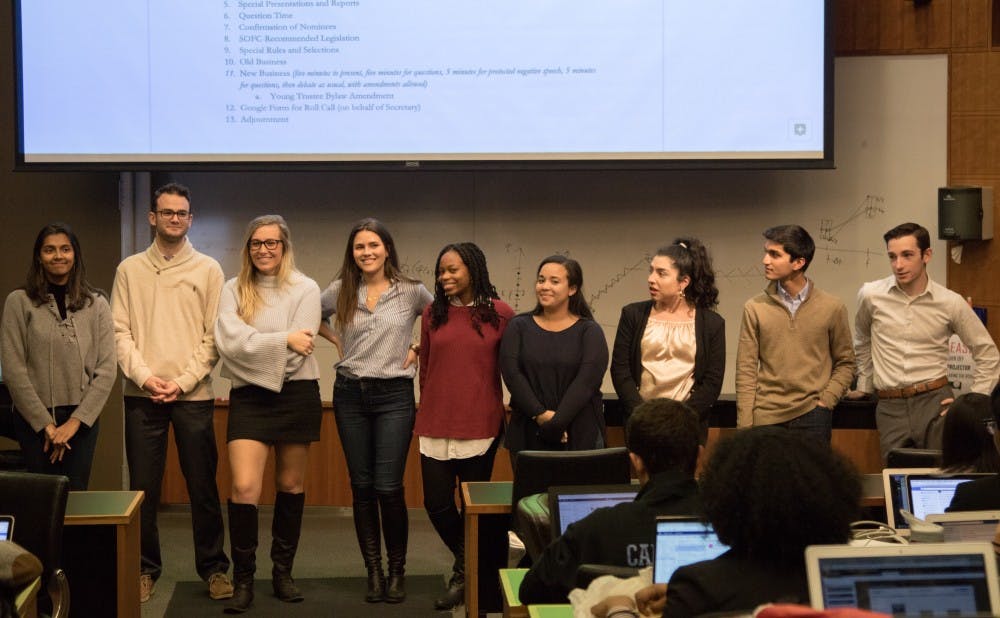On Wednesday, Duke Student Government Senate heard the first reading of an amendment to the by-laws for the Young Trustee Nominating Committee that would lower the number of necessary committee members.
Senate Pro Tempore Jackson Dellinger, a junior, classified the decrease in the minimum committee members from 10 to eight as a “simple change.” The amendment makes the selection of the committee a “little less complicated” and enables it to “sort out quorum issues," he said.
Previously, the by-law prescribed 10 to 12 members to serve on the YTNC, but it allowed two members to leave the committee. Dellinger described this former process as “relatively intricate."
With the amended by-law, University Secretary Richard Riddell and DSG President Riyanka Ganguly can select between eight and twelve members to the YTNC followed by a list of ranked alternate candidates.
Additionally, if the number of those serving on the committee drops below eight, alternates will be selected based on the order of the list until the committee reaches the required eight members. If the committee has gone through all the alternates on the list, senators can volunteer to serve on the committee.
An “alarming" number of people applied for the committee thinking that they were actually applying for the young trustee position, and added that there were fewer applications this year of the committee, Ganguly explained. In the spirit of clarity, Ganguly and Dellinger said they hope that this new standard will make the nominating process easier to understand.
Ganguly also noted that having fewer seats to fill allows the process to be more selective in choosing qualified candidates to serve on the committee.
“Lowering the minimum number of committee members does not require us to fill [as many] spots, so we can pick the best people,” she said.
In addition to changing the minimum number of members needed to fill the YTNC, the Senate will also vote whether to require seven members for quorum on the committee. The by-law currently specifies that two-thirds or seven members—whichever requires fewer people—satisfies a quorum for the YNTC to be able to conduct business.
Any undergraduate—other than the DSG president and non-work study students who are University employees—is eligible to apply to be a young trustee. The committee will pick two to four finalists from the application pool. From these candidates, the student body will elect the official nominee, who must be confirmed by the Board of Trustees prior to its February meeting.
In other business
Junior Luke Farrell, chair of the Student Organization Financing Committee, requested funding for four events on campus and the approval of two new student groups.
The Asian Students Association was funded $3,200 for its annual hot pot dinner–featuring a traditional Chinese cooking style of boiling meat and vegetables and eating it immediately afterwards. At the event, 10 to 12 people surround each boiling hotpot–fostering a community to embrace Asian culture for the 300 undergraduates in attendance.
The Jewish Student Union was funded $1,895 for its annual Chanukah celebration–Latkapalooza. Hosted at the Krafthouse, the event will provide food to its attendees and have an ugly sweater contest, a photographer and a canned food drive.
SOFC also provided $1,665 in funding for the Duke Catholic Center to host Carol Zaleski, professor of religion at Smith College. The lecture, called “C.S. Lewis in Defense of Romanticism, Reason and Christian Hope,” will discuss how Christianity greatly influenced the author.
The Singapore Student Association received $2,225 in funding to cover travel and lodging for speaker for the Duke ASEAN Alumni Series. Farrell noted that the Cultural Engagement Fund will provide the food costs. Speakers include Junaedy Liem, a Google employee, and Eu Fen Pan, who works at McKinsey & Company.
SOFC chartered a new student group called Duke SAFE. The organization serves as a student branch of the Wellness Center in addition to providing opportunities for students who want to maintain a substance-free lifestyle. Farrell pointed out that he has had continued correspondence with this organization in particular and it is “fully backed by the administration.”
Duke Science Olympiad—an organization that hosts science competitions—received recognition from SOFC in order for it to host tournaments and tournaments for Durham and the national community. The group was not chartered.
Correction: This article was updated to reflect that DSG Senate will vote on reducing the number of members on the YTNC, not that it already had. That vote will happen this week. The Chronicle regrets the error.
Get The Chronicle straight to your inbox
Sign up for our weekly newsletter. Cancel at any time.

Stefanie Pousoulides is The Chronicle's Investigations Editor. A senior from Akron, Ohio, Stefanie is double majoring in political science and international comparative studies and serves as a Senior Editor of The Muse Magazine, Duke's feminist magazine. She is also a former co-Editor-in-Chief of The Muse Magazine and a former reporting intern at PolitiFact in Washington, D.C.

